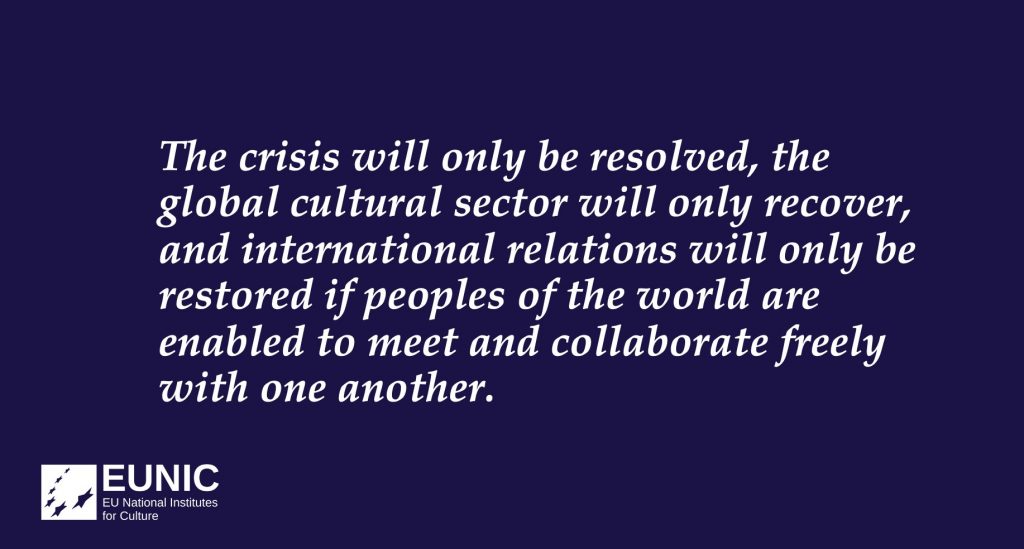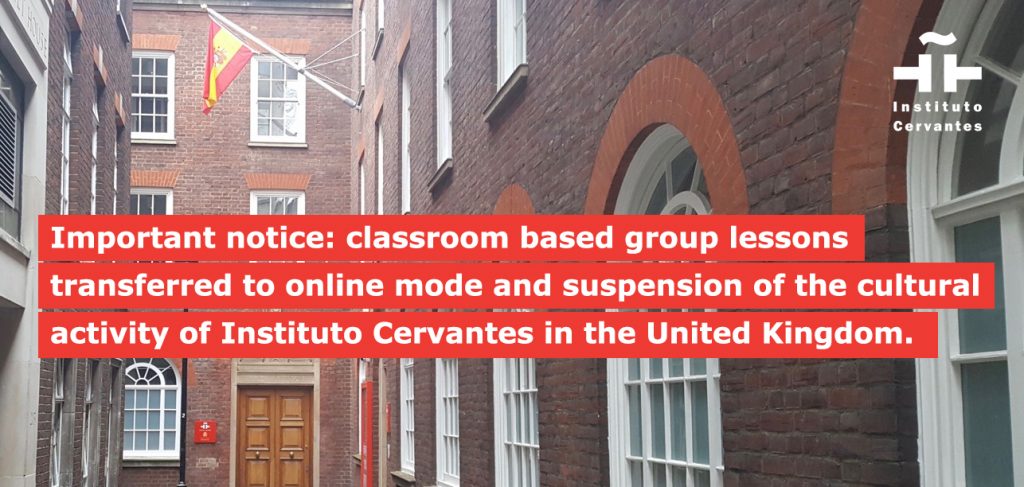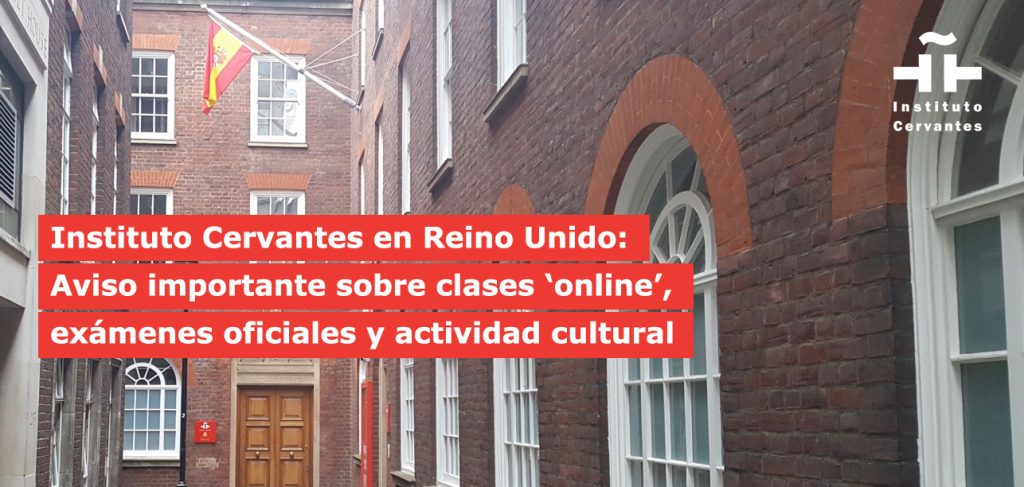For the future: Make cultural relations count in a post-crisis global society

The Covid-19 pandemic has a crushing effect on the work of international cultural relations. Activities and collaborations worldwide are cancelled or postponed, while most cultural venues are forced to close their doors. Artists and organisations, including our members, are severely affected by the abrupt discontinuation of their activities, which rely so heavily on people coming together to collaborate across borders. Actors in the field moved to the digital realm as an initial response, but how to go forward in the longer term? How can we ensure that, after this crisis, cultural relations continue to bring trust and understanding between the people of Europe and the wider world?
- Covid-19 effects on cultural relations work
In order to get an overview of the situation confronting international cultural relations, EUNIC is documenting and analysing the impact of the crisis on its members. Some major findings:
- An estimated 6.6 million euros of income was lost by EUNIC members due to branches closing.
- 85% of members temporarily closed at least half of their branches worldwide.
- Almost half were forced to cancel contracts with artists and experts.
- More than half foresee discontinuing or downsizing programmes.
- 13% are concerned about staff downsizing.
- Of those members who had to resort to new ways of gathering income, 40% have started to charge for their cultural offerings and 30% have applied for private funding.
- 85% of members are not eligible to apply for emergency government funding.
National, regional and local governments and other actors have taken important measures to mitigate the crisis and The European Commission has launched the Creatives Unite platform to gather such initiatives. We join a chorus of networks, organisations and individuals across Europe who have flagged the dire situation of culture in this crisis, calling for strong responses in support of the sector (e.g. Culture Action Europe, ECF, Europa Nostra, Members of the European Parliament, and many more).
However, many EU countries are focusing only on a response at national level, leaving behind our joint European and global responsibility. Barriers currently raised for public health reasons should not remain the norm. Now is no longer the time for countries to look inwards.
The crisis will only be resolved, the global cultural sector will only recover, and international relations will only be restored if peoples of the world are enabled to meet and collaborate freely with one another.

2. The importance of international cultural relations
Cultural relations generate a spirit of dialogue and global solidarity. Cultural relations can be at the heart of the solution to remain connected, resilient and in good mental health in the current situation. In the face of a truly global challenge, this is more important than ever. Cultural relations strengthen the idea of a shared Europe, increasing its self-reflection towards a common awareness of joint values.
Cultural relations are key in creating trust and understanding and a more peaceful world by bringing people together on a global scale. Cultural relations have played an important role in fostering peaceful relations between the peoples of the world. With all EU Member States dedicating a considerable amount of their budgets to cultural relations (EUR 2.9 billion in 2019), maintaining world spanning networks of cultural institutes (more than 2,500 branches with more than 35,000 staff), cultural relations have been over decades a prominent tool in foreign policy.
While cultural participation improves health and well-being, cultural relations can positively impact conflict resolution, peace building, and related policy development. Research has demonstrated that cultural access is the second most important determinant of psychological well-being.
Culture creates jobs and competitiveness and can play an important role in the global economic recovery. EU cultural employment is today at 8.7 million, making the sector one of the largest employers and providing jobs for 2.5 times more Europeans than the automotive sector. There is a EUR 8.7 billion trade surplus in cultural goods, and cultural and creative sectors are estimated to contribute 4.2% to EU gross domestic product (EU Agenda for Culture, 2018).
The global economy is driven by cultural creativity, innovation and access to knowledge. Cultural and creative industries represent around 3% of the global GDP and 30 million jobs (UNESCO, 2016). While global trade in creative products has more than doubled between 2002 and 2015, growing at a rate of 7% annually, mutual capacity building and the strengthening of the cultural and creative industries stimulate jobs, empowering youth and women to contribute to resilient economies (UNCTAD, 2019).
3. Ways forward
To counter the isolation of national cultural policies, transnational initiatives connecting artists and professionals across borders are being called for so that cultural exchange and intercultural dialogue can flourish.
To continue peace building, reaching out to people worldwide through culture is needed. As HR/VP Josep Borrell said on the World Day for Cultural Diversity for Dialogue and Development, “three-quarters of the world’s major conflicts have a cultural dimension. Bridging the gap between cultures is urgent and necessary for peace, stability and development.”
Local cultural sectors worldwide require support. Many countries are not in a position to devote additional resources to the cultural sectors. Here the EU can stride ahead and develop, together with authorities and organisations in partner countries, support schemes that help.
International mobility must not stop. Whereas questioning our traveling habits and reducing them for the sake of the environment is absolutely necessary, our friendly relations with the world depend on people meeting. Only by learning about each other can we develop trust and shed our fears and prejudices.
Our project “European Spaces of Culture” tests new ways of engaging in cultural relations and should be enlarged. The models found here can serve as way out of the crisis, starting a new kind of doing culture in the future – fair, equal, based on mutual listening and learning, co-creation and a bottom-up approach.
We must adapt our way of working in the digital realm, finding new, hybrid ways of doing cultural relations beyond the crisis. As the need for face-to-face meetings will remain permanent, 81% of EUNIC members are looking at developing hybrid formats that combine physical presence with virtual content. And while we are exploring digital means, we must leave no one behind. Communities without digital infrastructure must also be included in the programmes we develop to bring people together.
Cultural heritage is important for Europeans, as it is for the people from other continents. 71% of Europeans agree that “living close to places related to Europe’s cultural heritage can improve quality of life” (Eurobarometer 466). Working on cultural heritage in the framework of cultural relations can be a steppingstone to bring people together and start an honest and meaningful discourse with communities in partner countries about our past and responsibilities.
Cultural relations can play an important role in the global economic recovery. Creating cultural goods and engaging in culture does create a significant amount of jobs – jobs that bring value, empathy, peace and a sense of belonging to communities. Investing in culture together with our partners is the right thing to do now to emerge from this crisis as unscathed as possible.
4. What we must do now
“Culture is at the heart of progress: it can play a truly key role in the aftermath of the current crisis.” Along with this joint statement by HR/VP Josep Borrell and Commissioner Mariya Gabriel published on 21 May 2020, we must seize the opportunity to put cultural relations at the core of our efforts to combat the rippling effects of the coronavirus outbreak. As culture has proven to be essential in sustaining our societies in moments of crisis, culture must be protected from budget cuts in the post-crisis financial frameworks and EU budgets for culture must be substantially increased.
Therefore, we call on all actors in cultural relations to:
- Install measures so that culture is enabled to connect people worldwide, share values to improve international relations and learn from each other’s practice – including supporting EUNIC members
- Look beyond national borders and join efforts multilaterally to manage the crisis
- Demonstrate the power of effective cooperation in meeting the global challenges of our time, including better coordination of all EU activities in cultural relations
- Invest more in a joint EU foreign policy that includes an appropriate role for cultural relations
- Strengthen the organisational and financial set-up in the EU, including the European Commission and the European External Action Service, to engage in culture
- Continue investing in European cultural cooperation, resist cutting budgets for networks, co-capacity building and cultural relations activities on the ground
- Support multilateral initiatives under the EU strategic approach for international cultural relations
- Continue investing in culture within development cooperation programmes
- Strengthen the international component of Creative Europe
- Strengthen and continue existing initiatives such as “European Spaces of Culture” that can contribute to the overcoming of the crisis
- Make support to local cultural scenes worldwide a priority
- Engage in digital and hybrid ways to work in cultural relations
- Learn from each other’s current and future practice by a bottom-up process
Together, EUNIC and its members are ready to do their part.
Important notice: classroom based group lessons transferred to online mode and suspension of the cultural activity of Instituto Cervantes in the United Kingdom

Due to the health alert caused by coronavirus COVID-19, Instituto Cervantes in the United Kingdom, following British and Spanish authorities’ guidelines, has decided, in order to protect the health of all involved, to transfer its classroom based group lessons to online platforms and to suspend its cultural programme in the centers of London, Manchester and Leeds until further notice.
Please kindly check Instituto Cervantes in Manchester and Leeds’ websites for further details and announcements.
MEASURES FOR LONDON:
Academic activity: classroom based group lessons are suspended from Tuesday, March 17th. We will start teaching our classes remotely from Friday, March 20th.
Tuesday, March 17th, Wednesday, March 18th and Thursday, March 19th there will be NO group based class of any kind and these sessions will be moved at the end the course timetable.
The teacher in charge of each group will contact their students as soon as possible to give them precise details about the implementation of the classes on line, and about the recovery of 17th, 18th, and 19th on March sessions, when applicable.
We will continue to teach our classes remotely until the end of the present term.
- The Spanish AVE Global on-line courses, as well as the rest of the Instituto Cervantes’ on-line teacher training, are still in operation.
- The CCSE exam scheduled for March 26th in London goes ahead
- DELE exams in May are suspended. Students who registered will be contacted by Instituto Cervantes to reschedule their exam to July or September.
- All the scheduled cultural activities are postponed
- Our libraries will remain closed and the deadline for returns of any borrowed items will be extended accordingly. All the services of our electronic library will remain available. You may find additional information on the YouTube channel of each center (London, Manchester, and Leeds).
Please follow us here as well as on our website and our social networks for further updates of the situation and notification of the normalization of our activities.
For any questions or additional information, you can contact us via email in London (cenlon@cervantes.es), Manchester (cenman@cervantes.es) and Leeds (cenlee@cervantes.es).
Instituto Cervantes will continue to collaborate with authorities by conveying our plans and data and following the recommendations given in order to limit the spread of the COVID-2019 coronavirus.
Instituto Cervantes en Reino Unido: Aviso importante sobre clases ‘online’, exámenes oficiales y actividad cultural

Ante la alerta sanitaria provocada por el coronavirus COVID-19, el Instituto Cervantes en Reino Unido, siguiendo las directrices de las autoridades británicas y españolas, ha decidido, con el fin de proteger la salud de todos, la transferencia de sus clases presenciales a la formación en línea y la suspensión de su programación cultural. Estas medidas afectan a los centros de Londres, Mánchester y Leeds hasta nuevo aviso.
Por favor, consulte las webs del Instituto Cervantes en Manchester y Leeds para saber más detalles y leer más avisos.
MEDIDAS PARA LONDRES
- En el ámbito académico, las clases de grupo presenciales quedan suspendidas desde el martes 17 de marzo en el centro de Londres. Continuaremos impartiendo nuestras clases a distancia a partir del viernes 20 de marzo. El martes 17, miércoles 18 y jueves 19 NO habrá clases ni presenciales ni en línea y se recuperarán al final de cada curso.
El profesor encargado de cada grupo contactará a la mayor brevedad con sus estudiantes para darles detalles precisos sobre la puesta en marcha de las clases por vía telemática y sobre la recuperación de las clases no impartidas los días 17, 18 y 19.
Los cursos de español a través de Internet Ave Global, así como el resto de la formación en línea del Instituto Cervantes, siguen operativos.
El examen CCSE programado para el día 26 de marzo en el centro de Londres sigue en pie.
Los exámenes DELE de mayo quedan suspendidos. A los alumnos inscritos se les contactará desde el centro para reagendar su examen para las convocatorias de julio o septiembre.
- Las actividades culturales programadas quedan aplazadas
- Nuestras bibliotecas permanecerán cerradas, prorrogándose todos los préstamos actuales durante el tiempo de cierre. Se seguirán manteniendo todos los servicios de nuestra biblioteca electrónica. Sugerimos asimismo consultar el canal de Youtube de cada centro (Londres, Mánchester, Leeds).
Rogamos seguir con atención todas las comunicaciones realizadas por este medio, así como las publicaciones de nuestro portal y de nuestras redes sociales, pues iremos informando puntualmente de la evolución de la situación, y avisaremos también a través de ellos de la normalización de nuestras actividades.
Para cualquier consulta o información adicional, se puede contactar con nosotros a través de los correos electrónicos de Londres (cenlon@cervantes.es), Mánchester (cenman@cervantes.es) and Leeds (cenlee@cervantes.es).
En el Instituto Cervantes seguiremos prestando la máxima colaboración a las autoridades y llevando a cabo, con el mayor esmero y la mayor celeridad posibles, cuantas recomendaciones se indiquen con el fin de evitar la propagación del coronavirus COVID-2019.
STATEMENT BY INSTITUTO CERVANTES IN THE UK ON COVID-19 (CORONAVIRUS)
In light of the recent health alerts regarding the Coronavirus, we would like to assure you that the centres of the Instituto Cervantes in UK (Leeds, London and Manchester) remain open, with courses and events continuing as usual. We are keeping track of any new information or advice from Public Health England, the NHS and UK Government on the matter and will adopt any recommendations accordingly. Likewise, we urge the responsibility of our students to follow the hygiene measures and indications recommended by the British health authorities:
Furthermore, due to the risk of spread of the COVID-19 virus, it is requested by both the UK and Spanish health authorities that any person who has recently travelled to China (mainland China, Hong Kong, Macao), Singapore, South Korea, Iran or Italy shall self-isolate themselves at home for a period of 14 days on their return. This applies as well to any person who has been in close contact with a confirmed case of coronavirus.
If any of the abovementioned situations apply to you, we would be grateful if you could inform us. We will then alert the HSE and follow their recommendations on risk assessment. We will implement any measures and treat any specific case following the advice of the appropriate authorities.
The health and wellbeing of our staff and students remains our top priority and we will continue monitoring the situation and acting upon the information made available to us by the HSE.
COMUNICADO DEL INSTITUTO CERVANTES DEL REINO UNIDO SOBRE COVID-19 (CORONAVIRUS)
Ante la situación creada por la alerta sanitaria debida al Coronavirus, los Institutos Cervantes del Reino Unido (Leeds, Londres y Mánchester) comunican que los centros continúan abiertos y ofrecen sus cursos y sus actividades culturales programadas. Estamos pendientes de cualquier nueva información o medida que Public Health England, el NHS o el Gobierno de Reino Unido comuniquen al respecto con el fin de adoptar sus recomendaciones. Igualmente, instamos a la responsabilidad de nuestros alumnos para que sigan las medidas de higiene e indicaciones recomendadas por las autoridades sanitarias británicas:
Por otro lado, debido al riesgo de propagación del virus COVID-19, tanto las autoridades sanitarias del Reino Unido como las españolas solicitan que cualquier persona que haya viajado recientemente a China (China continental, Hong Kong, Macao), Singapur, Corea del Sur, Irán o Italia se aísle en casa por un período de 14 días a su regreso. Esto se aplica también a cualquier persona que haya estado en contacto cercano con un caso confirmado de coronavirus.
Si usted está en alguna de las situaciones mencionadas anteriormente, le agradeceríamos que nos informara cuanto antes. El Instituto dará parte al HSE y seguiremos sus recomendaciones sobre la evaluación de riesgos. Implementaremos cualquier medida y trataremos cualquier caso específico siguiendo el consejo de las autoridades correspondientes.
La salud y el bienestar de nuestros estudiantes y nuestro personal ha sido y sigue siendo nuestra prioridad principal y continuaremos monitorizando la situación y actuando de acuerdo con la información que HSE pone a nuestra disposición.


